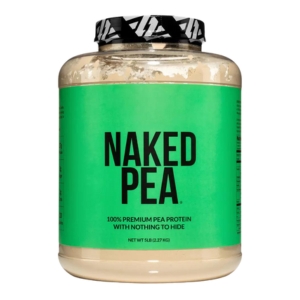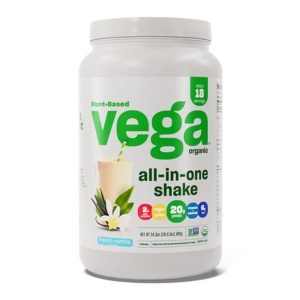 Expert's opinion
Expert's opinion
The article is a subjective view on this topic written by writers specializing in medical writing.
It may reflect on a personal journey surrounding struggles with an illness or medical condition, involve product comparisons, diet considerations, or other health-related opinions.
Although the view is entirely that of the writer, it is based on academic experiences and scientific research they have conducted; it is fact-checked by a team of degreed medical experts, and validated by sources attached to the article.
The numbers in parenthesis (1,2,3) will take you to clickable links to related scientific papers.
Best Pea Protein Powder 2024: Top 5 Supplements For Muscle Building
All articles are produced independently. When you click our links for purchasing products, we earn an affiliate commission. Learn more about how we earn revenue by reading our advertise disclaimer.
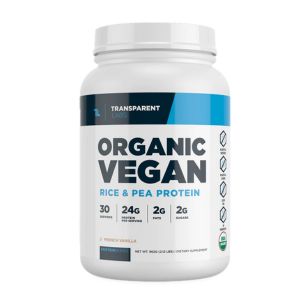
Transparent Labs Organic Vegan Rice & Pea
- 24 grams of protein per serving
- Gluten-free, sugar-free, non-GMO
- No artificial ingredients
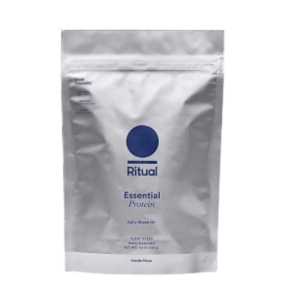
Ritual Essential Protein
- Informed-Sport Certified and the third-party testing
- Complete Amino Acid Profile
- Gluten and Major allergen-free
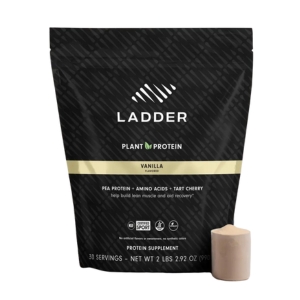
Ladder Premium Plant Protein
- Certified for Sport® certification
- No artificial ingredients
- Contains tart cherry for improved recovery
5 Best Pea Protein Powders On The Market In (April. 2024)
- Transparent Labs Organic Vegan Rice & Pea – Editor’s choice
- Ritual Essential Protein – Highest protein amount per serving
- Ladder Premium Plant Protein – Best formula for recovery
- Naked Nutrition Naked Pea Protein Powder 5LB – Best Pure Pea Protein
- Vega One All-In-One Shake – Best All-In-One Combo
5 Best Pea Protein Powders For Muscle Building In 2024
Transparent Labs Organic Vegan Rice & Pea Protein
A great, high-protein combination of rice and pea protein to help you gain lean muscle and facilitate muscle recovery without any artificial ingredients.
- 24 grams of protein per serving
- Gluten-free, Sugar-free, non-GMO
- No artificial ingredients
- May have come into contact with animal products
- May contain allergens
Transparent Labs Organic Vegan Rice & Pea Protein has a high-protein formula, which can help you increase lean muscle mass while promoting recovery and improving your overall body composition.
One serving contains 24 grams of protein, and it comes in two delicious flavors, French vanilla, and pure chocolate. It has a creamy, not chalky texture that mixes perfectly with any plant-based milk of choice, but it will work just as well with water.
Transparent Labs doesn’t use any artificial ingredients, colorings, additives, or ingredients. Free of genetically modified organisms(GMO) in its products, the Organic Vegan protein powder is no different. They use organic rice protein as well as organic pea protein, which ensures the quality and potency of the product.
Ritual Essential Protein
One of the best pea protein powders on the market with a complete amino acid profile and is free from all major allergens, making it suitable for practically anyone.
- Informed-Sport Certified and third-party tested
- Complete Amino Acid Profile
- Gluten and Major Allergen-Free
- Pricey
Ritual Essential Protein contains 20 grams of complete protein per serving. That means it’s the perfect addition to your diet when you need increasing your protein intake. Made from USA-grown organic yellow peas, it’s free from sugar, GMO, gluten, and all major allergens.
Additionally, the purity and high quality of this protein powder also meet the standard of the Informed-Sport certification. Certaipassed the rigorously screened for over 250 substances banned in sports.
Ritual Essential Protein formula can help build and maintain lean muscle mass, support satiety, promote brain health, and support bone health. It comes in a subtle yet delicious vanilla flavor and creamy texture that mixes well with any type of liquid or even overnight oats.
Ladder Premium Plant Protein
Arnie Schwarzenegger and Lebron James have one thing in common: Ladder Protein. This organic plant-based protein powder has a powerful and efficient formula that’s designed to help you build muscle and improve endurance while increasing your recovery rate.
- Certified via Sport® certification
- No artificial ingredients
- Contains tart cherry for improved recovery
- High price
BLadder Premium Plant Protein is made with a proprietary vegan amino acid blend containing L-leucine, L-methionine, L-isoleucine, and L-valine, as well as pea protein powder and tart cherry for improved recovery.
Not only features clean ingredients and no artificial flavors or additives, but also it’s sugar-free and sweetened with stevia. With 21 grams of protein per serving, it’s an amazing addition to your daily diet, especially if you’re looking to build muscle, improve your performance in the gym, and significantly increase your recovery rate. It comes in vanilla and chocolate flavors, and users report both to be delicious.
Naked Nutrition Naked Pea Protein Powder 5LB
With only one clean ingredient and nothing to hide, this protein powder is an amazing option for anyone just starting out and trying a vegan protein powder for the first time.
- 100% organic pea protein powder
- Free of additives and artificial sweeteners
- Independent third-party tested for heavy metals
- Expensive
- Not a complete protein
Due to the processing without any use of chemicals, this product makes for a superior amino acid profile, which is beneficial for muscle growth and post-workout recovery.
Still, the protein powder is not a complete protein, and only when combined with Naked Rice do all the amino acids come up to the full 20. That’s why we listed it as one of the most expensive because, to get the complete amino acid profile, you have to buy their Naked Rice protein powder as well.
One serving of the Naked Nutrition Pea Protein Powder contains 27 grams of protein and comes in three flavors: unsweetened (pure pea protein), chocolate (contains the added ingredients, coconut sugar, and cacao powder), and vanilla (contains the added ingredients, coconut sugar, and vanilla). The texture is creamy and smooth, making for a perfect post-workout shake.
Vega One All-In-One Shake
A great combination of protein, fiber, vitamins, minerals, and probiotics for a powerful boost of nutrients to help you build lean muscle, support and facilitate recovery, and optimize your overall health and well-being.
- Contains dietary fiber and micronutrients
- Contains probiotics
- Multi-sourced vegan protein blend
- Marketed as a meal replacement but lacking in some nutrients if used as such
- Processed in the same facility with animal products
Vega One All-In-One Shake contains a plethora of unique ingredients and plant compounds that can support your overall health beyond just building muscle. Its formula contains 20 grams of multi-source plant-based protein from pea protein, sunflower seed protein, and pumpkin seed protein for a complete amino acid profile. It also contains up to 50% of your daily value of 12 essential vitamins and minerals, 21% of your daily fiber intake, and two billion colony-forming units (CFUs) of probiotics in every single scoop.
It comes in seven amazing flavors, with each one adding just a simple touch of deliciousness to sweeten up your day. The protein powder itself is sugar-free, and it’s sweetened with stevia.
What Is Pea Protein Powder?
Whether you’re lactose intolerant, following a vegan diet, or simply want to add more plant-based ingredients to your diet, choosing a pea protein powder is a great way to get some additional protein.
Pea protein powder is extracted from yellow split peas, and it’s easily digestible. There are three different types of pea protein powder:
- Pea protein concentrate – contains additional carbohydrates (carbs) and fat
- Pea protein isolate – more processed pea protein of pure amino acids
- Textured pea protein – the most minor processed pea protein usually used for creating vegan “meat” and similar products
Who Should Use Pea Protein?
If you’re looking to increase your protein intake but don’t want to go in the standard whey protein direction, you will most likely come across pea protein powder, one of the most common plant-based protein powders on the market.
Usually, those who should use pea protein instead of whey fall under one (or more) of these categories:
- Those who are lactose intolerant and cannot digest whey protein powder
- Those following a vegan diet and do not eat any animal products
- For those who are iron deficient and don’t want to take iron pills – pea protein powder is rich in iron and can therefore be a great supplement for those who are deficient
Even though it’s a bit less bioavailable[1] than whey protein powder, it’s still a fantastic source of protein and its versatility means users can apply it in a plethora of different ways.
How We Decided Our Picks
When choosing the best pea protein powders, it’s important to look for a few key factors:
- Quality – the most important aspect of any product is quality. Ensuring you’re only putting the best quality ingredients into your body is crucial when it comes to optimizing your health and the health of your muscles.
- Testimonials – another important factor in choosing your protein powder comes from users. If the majority of people rave about the protein powder, its taste, and its texture, you better believe it’s coming on the list for reasons of overwhelming popular approval. Plant-based protein powders can sometimes taste very earthy, and when there’s a brand that manages to make it taste delicious without the use of artificial additives, it’s worth sharing.
- No artificial ingredients – we only chose protein powders that contain no artificial fillers, flavors, colorings, or thickening agents, as they are believed to be harmful to the human body.
How To Use Pea Protein Powder
Although you can use Pea protein powder at any time of the day for an added boost of protein, it’s still the most efficient and effective after your workout. You can simply add it to smoothies or smoothie bowls, turn it into a shake, make homemade protein bars, or even mix it with your overnight oats, porridge, or chia seed pudding; you can add it to banana bread and any other type of dessert.
Pea protein powder is quite versatile, so you can use it raw or bake with it. It just depends on your preference and how you like to get your 20+ grams of extra protein per day.
Benefits Of Pea Protein Powder
Nutritionally, pea protein powder comes with all the benefits of peas. It’s rich in iron, even though it’s less bioavailable[2] than iron coming from animal sources. Adding vitamin C supplements or vitamin C-rich foods when taking pea protein powder leads to boosting iron absorption by up to 67%[3].
People can use Pea protein powder for a variety of reasons, but mainly when trying to build muscle. Studies show that organic pea protein promotes muscle growth when paired with resistance training[4], helps promote satiety[5] balances out blood sugar levels, and promotes cardiovascular health[6] by lowering blood sugar levels and cholesterol.
Potential Side Effects
It seems that there are no notable side effects of taking pea protein powder as it’s generally really easy to digest and highly tolerable. This is especially true of organic pea protein isolate, which is the most common type of pea protein you’ll find in a protein powder. This type is stripped off of basically everything other than clean, pure branched chain amino acids, which avoids gassiness or gastrointestinal distress.
The only potential issue you might encounter is when a protein powder is relatively high in sodium. Some products contain 110–390 mg per serving, which can easily make you exceed the daily recommended intake of 2300 mg.
The Bottom Line
Pea protein powders are an amazing source of protein that’s easily digestible and appropriate for anyone. They usually contain no known allergens, and they’re versatile in their use. Whether or not you’re in need of a plant-based protein, because you’re lactose intolerant or you’re simply limiting your intake of dairy, pea protein powders contain essential amino acids to help you build muscle and promote efficient recovery. If you’re on the lookout for a great plant-based protein, choose one of these pea protein powders. However, notice the difference in your muscle strength, body composition, and recovery time will you find the great one.
Frequently Asked Questions
It seems like there are no real drawbacks to taking pea protein, except for its less bioavailability. When compared to whey protein, the amino acid profile is less bioavailable. Other than that, if you’re choosing a high-quality pea protein supplement without any artificial ingredients or additives, there is no reason why it would not be good for you.
One potential situation where pea protein wouldn’t be good for you is if you’re specifically allergic to peas. Always make sure you know your allergies before trying out a new supplement, even if it’s marketed as safe and healthy. Also, if you suffer from hypertension or cardiovascular problems, there may be an issue with sodium content, depending on the product you choose.
Yes, any pea protein supplement is safe unless you’re allergic to peas. In all other cases, pea protein powders pose a low risk of side effects, and they’re generally tolerated well.
Yes, pea protein powders contain all essential amino acids, but they are low in L-methionine; this is why they’re usually supplemented with other plant-based proteins such as rice, hemp, or soy. Amino acids are building blocks of your muscles, so wherever they come from, they are recognized by your body and absorbed to increase muscle size.
Pea protein is a great choice for people who cannot tolerate whey protein, follow a vegan diet, or are looking to limit their intake of dairy products. It can help you build muscle, increase recovery, and improve your overall fitness.
+ 6 sources
Health Canal avoids using tertiary references. We have strict sourcing guidelines and rely on peer-reviewed studies, academic researches from medical associations and institutions. To ensure the accuracy of articles in Health Canal, you can read more about the editorial process here
- Gorissen, S., Crombag, J., Senden, J., Waterval, W., Bierau, J., Verdijk, L. B., & van Loon, L. (2018). Protein content and amino acid composition of commercially available plant-based protein isolates. Amino acids, 50(12), 1685–1695. https://doi.org/10.1007/s00726-018-2640-5
- Hurrell, R., & Egli, I. (2010). Iron bioavailability and dietary reference values. The American journal of clinical nutrition, 91(5), 1461S–1467S. https://doi.org/10.3945/ajcn.2010.28674F
- Hallberg, L., & Hulthén, L. (2000). Prediction of dietary iron absorption: an algorithm for calculating absorption and bioavailability of dietary iron. The American journal of clinical nutrition, 71(5), 1147–1160. https://doi.org/10.1093/ajcn/71.5.1147
- Babault, N., Païzis, C., Deley, G., Guérin-Deremaux, L., Saniez, M. H., Lefranc-Millot, C., & Allaert, F. A. (2015). Pea proteins oral supplementation promotes muscle thickness gains during resistance training: a double-blind, randomized, Placebo-controlled clinical trial vs. Whey protein. Journal of the International Society of Sports Nutrition, 12(1), 3. https://doi.org/10.1186/s12970-014-0064-5
- Smith, C. E., Mollard, R. C., Luhovyy, B. L., & Anderson, G. H. (2012). The effect of yellow pea protein and fiber on short-term food intake, subjective appetite, and glycaemic response in healthy young men. The British journal of nutrition, 108 Suppl 1, S74–S80. https://doi.org/10.1017/S0007114512000700
- Girgih, A. T., Nwachukwu, I. D., Onuh, J. O., Malomo, S. A., & Aluko, R. E. (2016). Antihypertensive Properties of a Pea Protein Hydrolysate during Short- and Long-Term Oral Administration to Spontaneously Hypertensive Rats. Journal of food science, 81(5), H1281–H1287. https://doi.org/10.1111/1750-3841.13272

